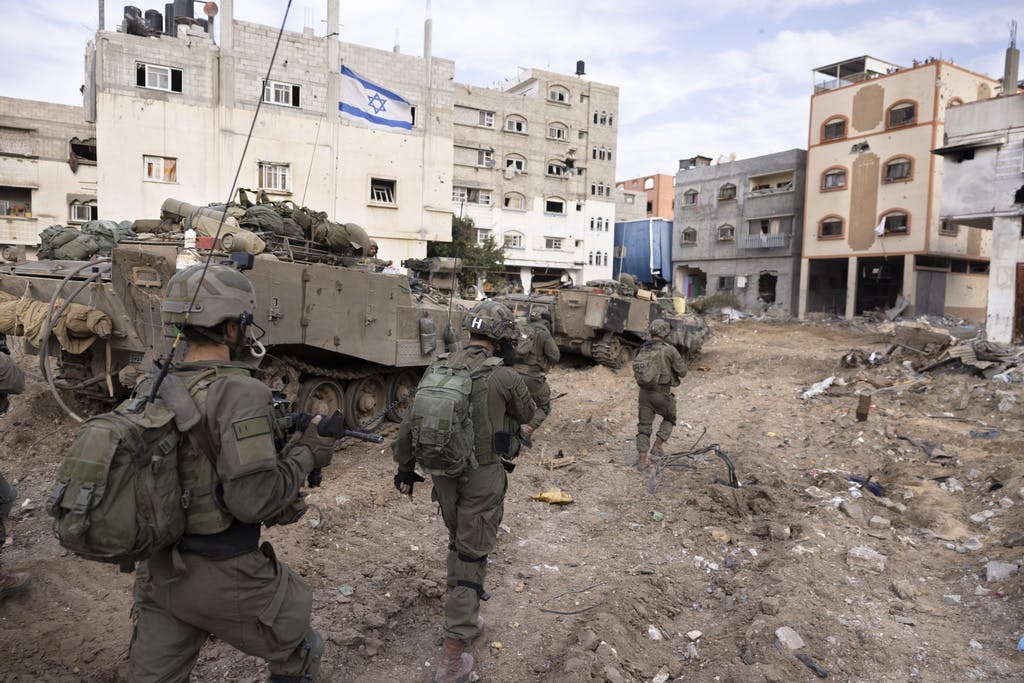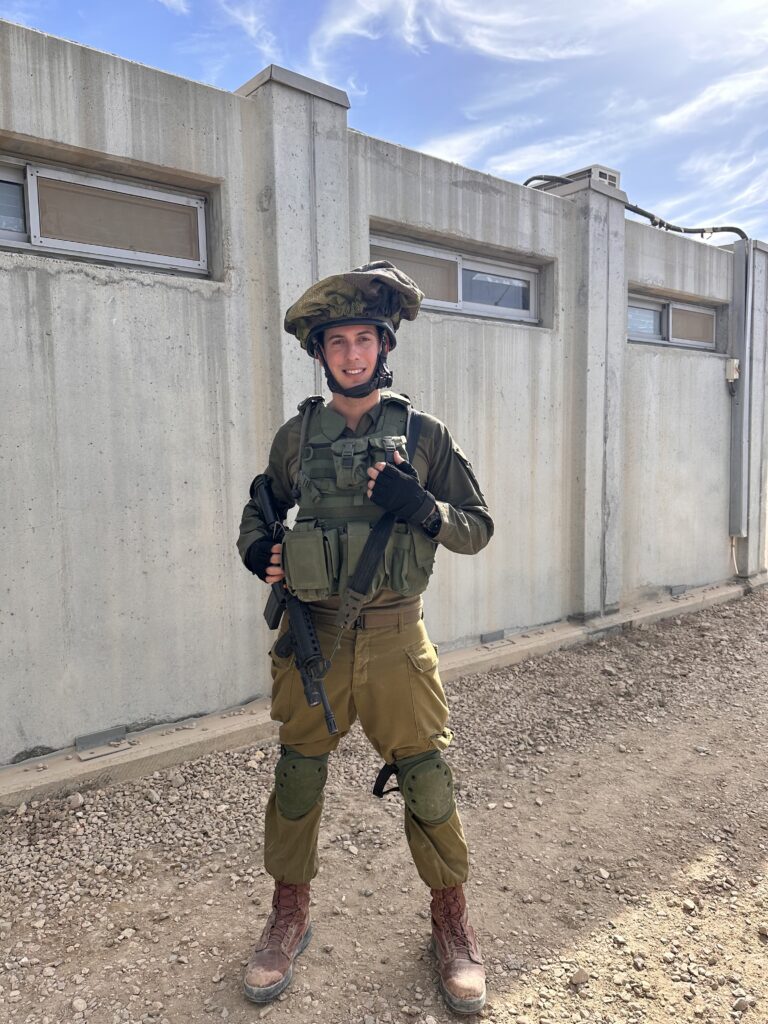Israeli Soldier, Armed With ‘Facts and Truth,’ Tours America To Warn That Israel Is but the First Line of Defense in This War
Paratrooper tells American audiences that protecting the international order requires defending the Jewish state.

With the information war between Israel and Hamas almost as heated as the conflict on the battlefield, it takes the first-hand testimonies of Israelis serving at Gaza to show the American public the urgency with which the Jewish state must fight for its self-determination in the wake of the atrocities committed on October 7.
One paratrooper in the Israeli Defense Forces flew to New York City this week to tell the painful “truth” that many in America have come to disregard or outright deny. In a conversation over coffee, Shahar tells the Sun that Israel’s defense against Hamas’s unrelenting aggression matters not just for its own future — but for that of the Jewish diaspora, for America, and for Western values at large.
“We’re the first line of defense of Western civilization,” says Shahar, who asked that only his first name be published for security reasons. He wears a suit with a pin of the Israeli flag intertwined with the American flag. “If we’re not there, Iran is going to take the whole Middle East, turn it into the largest air infrastructure base in the world, and just move to Europe and America.”

The horrors of Hamas he witnessed on October 7 are animating his mission. Born and raised at Israel, Shahar left his post as vice president of a cybersecurity company when he was called up from the reserves that morning. At age 30, he estimates that he has pulled reserve duty 100 times since finishing active duty in Israel’s special force. This time, however, he knew the mobilization would be different.
Arriving at an Israel Defense Forces base, Shahar was given a dog tag with his name and military number, along with a pre-packed military bag. Within ten minutes, the soldiers were on a bus to Gaza. “Protect both our hearts,” his mother told him over the phone before he departed. “I started crying,” he reflects, “and I never cry.”
Yet, he says, “I went proudly, fighting the most justifiable fight.”
During the ride, someone said, “Maybe you guys should write a will.” Shahar wrote on his phone a short will and a goodbye letter that reads, “open in case of emergency.”
When Shahar arrived at a Kibbutz near Israel’s Southern border, he saw “a combination of an apocalyptic movie and a horror movie” — a town turned to ash, bloodied bodies strewn across the ground, and unidentifiable women with broken hips. What he thought was a burnt tree log turned out to be two people hugging, paralyzed by fire. The scene reeked of “the smell of death,” he says. “I’ll never be able to unsmell it.”
When a missile hit Shahar in the head, knocked him to the ground, and landed him in the hospital, “the doctors told me that for me, this war was over,” he recalls. “I told them that I thank them for the advice, but as long as I can walk and help, I’m going to go back to my unit.” His grandparents were Holocaust survivors, and his father fought in the Yom Kippur War of 1973, “so it felt like this is our generation’s turn to ensure the future of the people of Israel.”
The IDF’s ground operations against Hamas have been challenging, he says. “Gaza is the most complicated place on earth to fight,” Shahar says, “because they have over 300 miles of tunnels with thousands of entrances.” He compares this infrastructure to the New York City subway system but crammed with Hamas terrorists, their equipment — including cars — and Israeli hostages instead of trains. By that analogy, New Jersey, of comparable square milage, would be Israel.
Despite the death toll reported by the Hamas-controlled Ministry of Health at Gaza, Israeli forces have sought to minimize civilian casualties, a mission made difficult when Hamas terrorists dress not in their uniforms, but in plain clothes. “Why do you think they hide amongst the civilian population?” Shahar asks. “So when we do kill them, they can be counted as civilians.”
To trap Israeli soldiers, Hamas has built thousands of pre-armed buildings disguised as hospitals, mosques, and homes, while hiding behind human shields, Shahar says. His friend found an entrance to a tunnel under a stroller in a kindergarten classroom of a school. “They’re just waiting for us to make the wrong step,” he says, “and be blown to pieces.”
“We died because of our morality,” Shahar says of the tragic fate of some of his colleagues, including his family member who served in the same reserve unit, Daniel Sheinkerman. Meanwhile, Hamas has “won the PR war.” They’ve propped themselves up as the saviors of Palestinians and the victims of the Israelis, a narrative that has found a footing of sorts on American soil, especially on its elite college campuses.
Waves of demonstrations against what activists call Israel’s “genocide” at Gaza have targeted New York City transit hubs for weeks. “If they really wanted to support the Palestinians,” Shahar says of these protesters, “they would move from the Palestinian protest to the pro-Israel protest, because we are the only ones that can get safety back in our streets and also in theirs.”
As with Isis, Al-Qaeda, and Hezbollah, to support Hamas is to endorse “this radical jihadist ideology,” he says. It “creates these terror organizations that want to destroy you just like they want to destroy us.” That ideology, he says, raises new generations of terrorists who will join the jihadist group, Iranian Bonyad Shahid, and be glorified as martyrs.
GoPro footage of Hamas’s October 7 massacre has been privately screened at the United Nations and other venues. Shahar encourages the creation of another film, in cooperation with the families of victims who agree to be featured, that could be released to the general public. “It’s very important,” he says, “because people still deny that this happened.”
Shahar asserts, however, “I’m never going to ask someone to support Israel. It’s not my job. I could just provide them with the facts and truth.”

